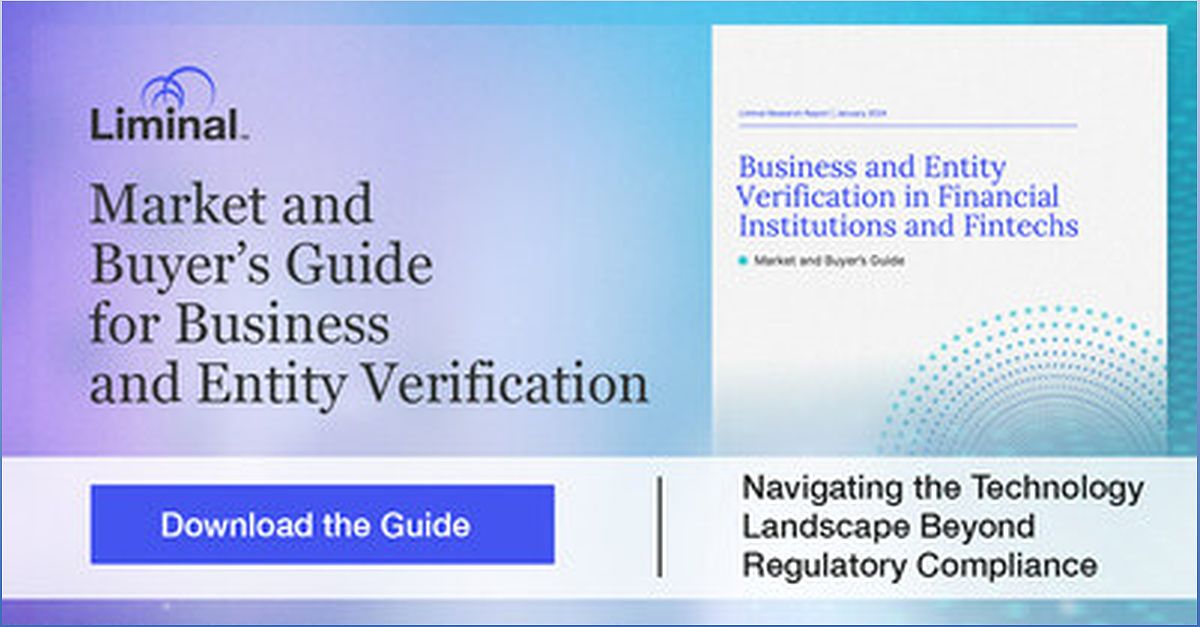Improving Business and Entity Verification in Financial Institutions and Fintech
Financial institutions and fintech providers are adapting their verification processes to meet regulatory requirements and combat fraud and money laundering risks. Learn about the growing demand for efficient and adaptable business and entity verification solutions that offer greater data accuracy and recency. Explore how Liminal's Market and Buyer's Guide predicts the market's growth and the challenges faced by financial institutions in navigating compliance and fraud concerns. Discover the benefits of automated solutions, cross-border verification, and advanced functionalities in improving customer experience and reducing risk. Stay informed about the evolving landscape of business and entity verification in the financial services and fintech sectors.
The Importance of Business and Entity Verification
Business and entity verification plays a crucial role in the operations of financial institutions and fintech providers. It helps ensure compliance with regulations, reduces fraud and money laundering risks, and enhances customer trust.
By verifying the identity and attributes of business customers during the onboarding process, financial institutions can mitigate regulatory non-compliance and prevent fraudulent activities. This verification process also contributes to a more secure and transparent financial ecosystem.
With the increasing focus on data accuracy and recency, there is a growing demand for efficient and adaptable business and entity verification solutions. These solutions offer advanced functionalities to address compliance challenges, cross-border verification, and fraud concerns while prioritizing a seamless customer experience.
The Market Potential for Business and Entity Verification
According to Liminal's Market and Buyer's Guide, the global total addressable market for business and entity verification in financial services and fintech is estimated to reach $4.4 billion in 2024. It is projected to grow at a compound annual growth rate of 6.1% and reach $5.5 billion by 2028.
This significant market potential reflects the increasing need for reliable and accurate business and entity verification solutions. Financial institutions and fintech providers are recognizing the value of these solutions in reducing risk, improving compliance, and enhancing overall operational efficiency.
As regulatory standards continue to tighten globally, the demand for business and entity verification solutions that offer advanced functionalities and adaptability will only increase. This presents a significant opportunity for providers in the market to innovate and meet the evolving needs of financial institutions and fintech companies.
Challenges in Business and Entity Verification
Financial institutions and fintech providers encounter several challenges when it comes to business and entity verification. One of the primary challenges is the manual verification process, which is time-consuming and prone to errors.
Cross-border verification poses another significant challenge due to varying regulatory requirements and the need to access accurate and up-to-date data from different jurisdictions. This can result in delays and inefficiencies in the onboarding process.
Additionally, the evolving nature of fraud and money laundering techniques requires continuous adaptation and advanced functionalities in verification solutions. Financial institutions and fintech providers need to stay ahead of these challenges to maintain compliance and protect their customers.
The Shift Towards Automated Solutions
To address the challenges in business and entity verification, financial institutions and fintech providers are increasingly adopting automated solutions. These solutions leverage advanced technologies such as artificial intelligence and machine learning to streamline the verification process.
Automated solutions offer several benefits, including improved accuracy, faster onboarding times, and enhanced compliance. They can efficiently verify business customers' identities, assess risk factors, and ensure regulatory compliance in a fraction of the time compared to manual processes.
By embracing automation, financial institutions and fintech providers can not only reduce operational costs but also enhance the overall customer experience. Automated solutions enable a seamless and efficient onboarding process, improving customer satisfaction and loyalty.
Choosing the Right Business and Entity Verification Solution
When choosing a business and entity verification solution, financial institutions and fintech providers should consider several factors. One crucial factor is the solution's ability to handle cross-border verification and comply with different regulatory requirements.
Accuracy and reliability are also essential considerations. The solution should provide up-to-date and accurate data to minimize the risk of fraud and ensure compliance. Additionally, advanced functionalities such as risk assessment and fraud detection can further enhance the effectiveness of the verification process.
Integration capabilities, scalability, and ease of use are other factors to evaluate. The solution should seamlessly integrate with existing systems, scale with the institution's growth, and be user-friendly for both employees and customers.
By carefully considering these factors, financial institutions and fintech providers can choose the right business and entity verification solution that meets their specific needs and enhances their overall operations.

